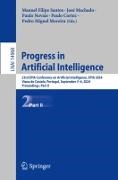Read more
The 3-volume set LNAI 14967, 14968, and 14969 constitutes the proceedings of the 23rd EPIA Conference on Artificial Intelligence, EPIA 2024, held in Viana do Castelo, Portugal, during September 3-6, 2024.
The 94 full papers presented in these proceedings were carefully reviewed and selected from 187 submissions. The papers are organized in the following topical sections:
Volume I:
AI and Creativity (AIC); Ambient Intelligence and Affective Environments (AmIA); Artificial Intelligence and IoT in Agriculture (AIoTA); Artificial Intelligence and Law (AIL); and Artificial Intelligence for Industry and Societies (AI4IS).
Volume II:
Artificial Intelligence in Medicine (AIM); Artificial Intelligence in Power and Energy Systems (AIPES); Artificial Intelligence in Transportation Systems (AITS); Ethics and Responsibility in AI (ERAI); and General AI (GAI).
Volume III:
Generative AI - Foundations and Applications (GenAI); Intelligent Robotics (IROBOT); Knowledge Discovery and Business Intelligence (KDBI); Natural Language Processing, Text Mining and Applications (TeMA); and Data-Centric AI - Solutions and Emerging Technologies (DCenAI).
List of contents
Artificial Intelligence in Medicine (AIM).- Synthetic Data for Robust Identification of Typical and Atypical Serotonergic Neurons using Convolutional Neural Networks.- Profiling Atopic Dermatitis Patients Using Decision Tree Classifiers to Anticipate Dupilumab Response.- Modeling Temporal Dynamics in Irregular ICU Data Using MWTA-LSTM.- Evaluating Asthma in Equines with Video Recordings.- Predicting Surgical Site Infections: a Time to Event Approach.- A Study on Automatic Analysis of Handwriting Alterations due to Parkinson's Disease.- Cervical Cancer Detection in Pap Smear Images.- Automating the Clock Drawing Test with Deep Learning and Saliency Maps.- Acute Pancreatitis Mortality Prediction With Federated Learning.- Predictive Modeling for Medication Administration in Intensive Medicine: A Data-Driven Approach.- Artificial Intelligence in Power and Energy Systems (AIPES).- A Review of Intelligent Technologies in District Heating Systems.- Intelligent Data Mining on Power Systems: Examples from Case Studies.-Application of a Genetic Algorithm for Optimising the Location of Electric Vehicle Charging Stations.- Retrieval-augmented Generation based Assistant: A Smart Home Case Study.- Dynamic Online Parameter Configuration of Genetic Algorithms using Reinforcement Learning.- Assessing Advanced Computer Vision Techniques in Aerial Imagery: A Case Study on Transmission Tower Identification.- Generative Adversarial Networks for Synthetic Meteorological Data Generation.- Artificial Intelligence in Transportation Systems (AITS).- Fuel Efficiency Analysis of the Public Transportation System Based on the Gaussian Mixture Model Clustering.- Multi-Agent Based Simulation for Decentralized Electric Vehicle Charging Strategies and their Impacts.- Bi-LSTM Neural Networks for Traffic Flow Prediction: A Comprehensive Analysis.- Imbalance Management on Free-floating VSS: A Multi-agent Model Approach.- Ethics and Responsibility in AI (ERAI).- GASTeNv2: Generative Adversarial Stress Testing Networks with Gaussian Loss.- A Multidimensional Taxonomy for Recent Trends in Explainable Artificial Intelligence.- Explainability of fMRI Decoding Models can Unveil Insights into Neural Mechanisms Related to Emotions.- Dynamics of Fisheries in the Azores Islands: A Network Analysis Approach.- General AI (GAI).- Detection and Classification of Spam in Social Media Comments using Artificial Intelligence - a Case Study.- A Comparative Study of Continual Backprop.- Time Series Data Augmentation as an Imbalanced Learning Problem.- Domain Reductions after Preprocessing: Effects on Dynamic Variable Ordering in Constraint Satisfaction Search.- Efficient Image Search and Retrieval System in Cloud Platforms.- Unveiling Cetacean Voices: Entropy-Powered Spectrogram Denoising for Deep Learning Applications.

